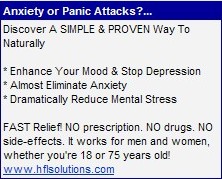Anxiety Disorders and The Different Types
There are different types of anxiety disorders. The symptoms will be different for the disorders, as will different people, experience different symptoms. Knowing what symptoms you may experience helps you and your doctor with how you can control your anxiety and panic attacks.
Post-Traumatic Stress
Post-traumatic stress is a common anxiety disorder experienced by people who:
- May have been soldiers or who have lived in war-torn areas
- Who have gone through natural disasters
- Who have been the victim of a crime inflicted upon them.
The terrible occurrence or series of events in their life triggers certain reactions such as being jumpy or tense at inappropriate times, such as when someone touches them unexpectedly. They may even avoid people or places that remind them of the trauma. Post-traumatic is one of those anxiety disorders that can reveal itself weeks, months, or even years after the event itself is over.
Social Anxiety Disorders and Generalized Anxiety Disorder
Social anxiety disorders can take the form of agoraphobia, which is the fear of open places or large crowds, or generalized anxiety disorder where a person is tense and anxious at all times. These types of anxiety disorders are specifically related to people and especially strangers; rarely do they occur when someone is safe in their own home or in a familiar place.
Panic Attacks or Panic Anxiety Disorder
Panic attacks are also classified as a type of anxiety disorder. This feeling of panic can come on at any time or anywhere; some even experience them when in their own bed! They can also be triggered by certain uncomfortable events or circumstances, such as being in a crowded room or when needing to do some public speaking. Panic anxiety disorder can be experienced by children, or can develop in adults for what seems like absolutely no reason at all.
If you think that you are suffering from any of these types of anxiety disorders or have any other concerns regarding your mental or emotional health, it’s always advised that you speak with a health care professional. He or she may be able to recommend certain medications or forms of therapy that might not always make the anxiety disorder go away, but can help you control it and get on with your life. The important thing to remember is that you can overcome anxiety and that there is help available, whatever your condition or concern.
If you are concerned that you may have to seek medical help for anxiety disorders there are also natural anxiety treatments available.
Anxiety Causes Are More Than One
Anxiety is one of those things in life difficult to describe. When you’re anxious all the time it can actually make you feel as if you’re losing control emotionally and mentally. That really frightens some people and prevents them from seeking help. When you are anxious about life in general, or have a phobia about something in particular, you have an emotional disorder.
Fortunately, emotional disorders such as anxiety are very open to treatment. You can even help yourself in many cases through proven self-help methods. There are lots of panic and anxiety gone programs, tapes, books and so on that show you how to stop needless worrying and start enjoying living. You can absolutely recover from anxiety. Of course, there are subdivisions of general anxiety. They include classifications like panic disorder and agoraphobia. All forms of anxiety disorders are treatable.
A lot of people don’t realize that there can be many causes of anxiety instead of just one. When you are a worrier, you can usually pinpoint a particular reason why you’re worrying at that moment. But anxiety can have many underlying causes meaning you have to dig deeper to understand the sources. The causes can run the whole gamut too – from physical to emotional.
When you talk about the causes of anxiety, you might be surprised at how many possibilities exist. For example, you might have a personality that lends itself to anxiety.
You can experience anxiety because of unrelenting stress in your life or constant negative thinking. If you have low self-esteem you can also be prone to anxiety attacks. I guess though, the bottom line is no matter what causes may be creating anxiety, you won’t feel better until you begin a ‘panic away‘ therapy program.





